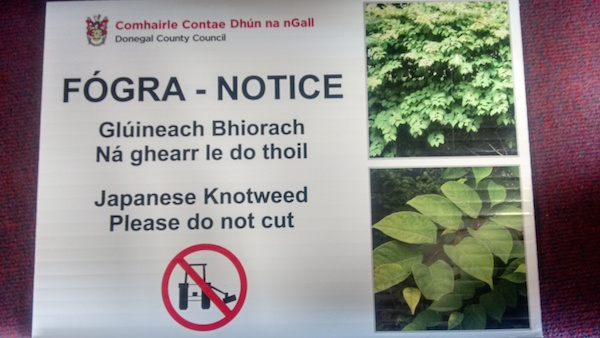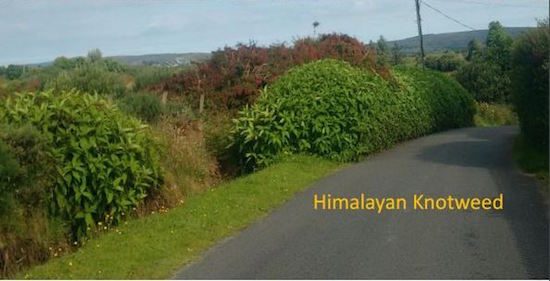Donegal County Council is currently embarking on a 4 year Invasive Alien Plant Species (IAPS) treatment programme on public roads which will see contractors being appointed in the coming weeks.
This follows on from a pilot project which was initiated in Donegal in 2015 to trial different treatment options for the eradication of invasive plants with a view to recommending the most effective, including cost effective, preferred option for future use.
Invasive alien plants species are initially transported through human activities outside of their natural range and then survive, reproduce and spread.
These species have negative impacts on the ecology of their new location and when growing close to road carriageways, these species can impact on sight lines, cause damage to the road infrastructure by growing up through the asphalt at the road edge and other structures.
Speaking this week Brendan O’Donnell Senior Engineer with Donegal County Council explained that the spread of non-native invasive plant species is an ever increasing problem facing local authorities not only in Ireland but across the world and one of the most problematic of the non-native species in Ireland is Japanese Knotweed which is highly invasive and extremely difficult to eradicate completely.
Treatment Programme
“The knowledge base around the most effective way to manage the spread of these plants is slowly increasing. Current treatment practices include spraying with herbicide, foliage removal & stem injection, stem injection and excavation & deep burial” says Brendan O’Donnell.
He adds “When treating with pesticide the timing of treatment is critical, as is the pesticide to be used. Late in the season just before the plant dies back for the winter appears to be the most effective. The primary objective of control is the total eradication by targeting the underground rhizome and not simply the aerial parts”.
Transport Infrastructure Ireland (TII) has introduced an eradication programme on selected national roads this year and plan to treat knotweed infestations along entire routes and Donegal will be included in the first routes to be treated.
In relation to non-national roads, Donegal County Council has set aside €50,000 in the 2016 Budget to treat roadside infestations and it is intended to set aside a similar amount annually until the spread of this plant is brought under control. It is expected that each infestation will need to be treated for a minimum of four years in succession to ensure eradication.
“The Council is currently gathering information on the location and scale of knotweed infestations around the county and we will use this information to develop the treatment programme” explains Brendan O’Donnell.
“The full extent of knotweed infestations is not clear yet however anecdotal evidence would suggest that we are unlikely to be able to treat all infestations in the first years. We aim to have a contractor appointed in time for a treatment programme to commence in September and the use of specialised equipment will be needed for the majority of the infestations”.
Signage
Signage will be erected at all infestation sites as a means to managing the further spread of these plants. Knotweed is spread from plant fragments and a lack of awareness of the plant among those carrying out roadside hedge cutting is contributing to the spread and as a further management measure it is intended to erect signage at all infestation sites to help prevent them being cut.
It will be necessary to continue to cut back hedges where existing infestations are blocking visibility or generally creating a hazard on the road network however, it is planned to do this cutting manually to avoid spreading the infestation and cuttings will continue to be left on site until an alternative disposal method can be agreed.
Private Lands
Many infestations span both public and private lands however the Council has no authority to treat infestations on private lands. In circumstances where an infestation is thought to have originated from the roadside and from there spread to private lands the Council intends to consult with the landowner to get their consent to allow the treatment of all of the infestation.
Further information on this Treatment Programme is available at www.donegalcoco.ie and anyone concerned about Invasive Plant Species on their own land should get more information at invasivespeciesireland.com.
If a member of the public becomes aware of an invasive plant species growing along our roads we would ask you to contact the Council at 074 91 53900 or email info@donegalcoco.ie or report it online at www.donegalcoco.ie









